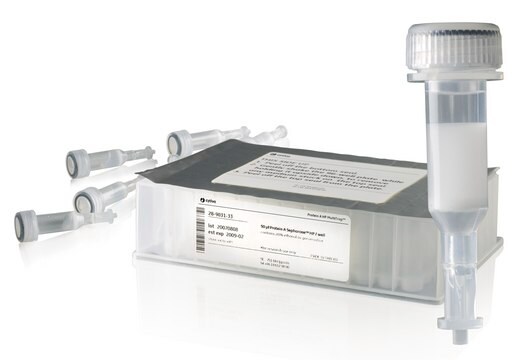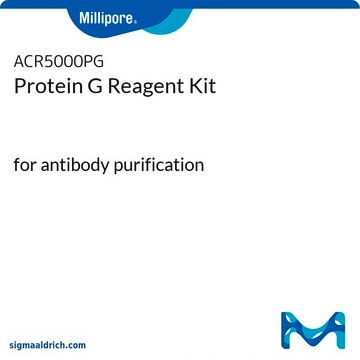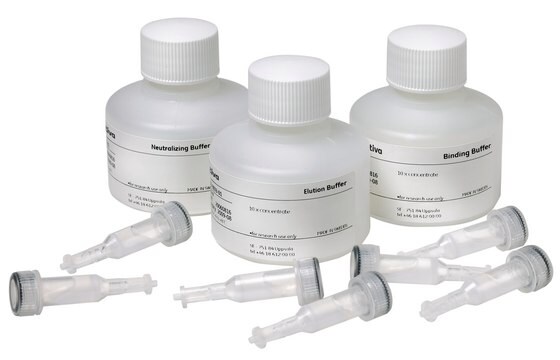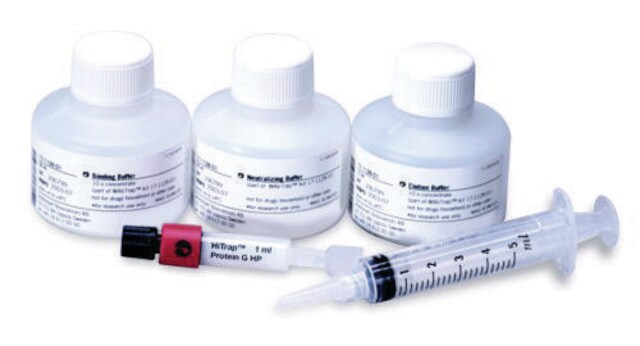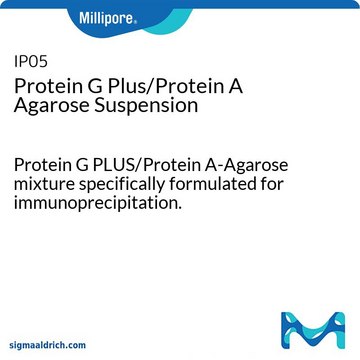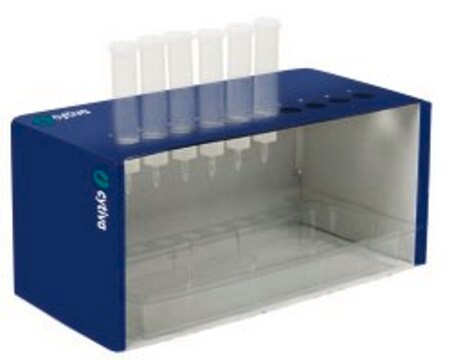PURE1A
Protein A Antibody Purification Kit
sufficient for 10 purifications
Se connecterpour consulter vos tarifs contractuels et ceux de votre entreprise/organisme
About This Item
Code UNSPSC :
12352203
Nomenclature NACRES :
NA.32
Produits recommandés
Utilisation
sufficient for 10 purifications
Conditions d'expédition
wet ice
Température de stockage
2-8°C
Description générale
The Protein A Antibody Purification Kit provides all of the reagents necessary to isolate monoclonal and polyclonal antibodies.
Spécificité
Capacity/Run (by Species)
Human IgG 20-25 mg
Mouse IgG1 8-12 mg
Mouse IgG2a 10-15 mg
Mouse IgG2b 6-10 mg
Mouse IgG3 15-20 mg
Rabbit IgG 8-12 mg
Goat IgG 2-4 mg
Bovine IgG 8-12 mg
Human IgG 20-25 mg
Mouse IgG1 8-12 mg
Mouse IgG2a 10-15 mg
Mouse IgG2b 6-10 mg
Mouse IgG3 15-20 mg
Rabbit IgG 8-12 mg
Goat IgG 2-4 mg
Bovine IgG 8-12 mg
Application
PURE-1A offers Protein A technology in a prepackaged, easy to use kit form. With this kit, milligram quantities of IgG can be purified from serum, ascites, or cell culture supernatants.
Purification of IgG from other species may be possible, however, the researcher will have to determine the suitability of the kit for their application.
The Protein A Antibody Purification Kit is suitable for use with IgGs from human, mouse, rabbit, goat, and bovine species.
Caractéristiques et avantages
- High capacity - purify up to 8 mg of mouse IgG or 25 mg of human IgG per column run
- Specific - will only bind IgG
- Easy to use - antibody is eluted and desalted in a single step, ready to use
- Gentle - avoids prolonged exposure of the antibody to low pH
Principe
Using our cartridge system, antibodies elute as highly purified proteins at physiological pH. Protein A is a powerful tool for isolation of antibodies from mammalian hosts. Protein A exhibits a high degree of specificity for IgG and ensures an antibody preparation virtually free of IgA, IgM and non-immunoglobulin serum proteins such as albumin.
Clause de non-responsabilité
For U.S. Customers: Contains mercury; Do not place in trash - dispose according to local, state, or federal laws.


Composants de kit seuls
Réf. du produit
Description
- Binding Buffer 225 mL
- Desalting Cartridge 1 ea
- Elution Buffer 75 mL
- HEPES Buffer 225 mL
- 5 ml Syringe 1
- 10 ml Syringe 1
- Protein A Cartridge 1 mL
- Regeneration Buffer 75 mL
Afficher tout (8)
Produit(s) apparenté(s)
Mention d'avertissement
Danger
Mentions de danger
Conseils de prudence
Classification des risques
Acute Tox. 4 Oral - STOT SE 1
Code de la classe de stockage
6.1C - Combustible acute toxic Cat.3 / toxic compounds or compounds which causing chronic effects
Point d'éclair (°F)
Not applicable
Point d'éclair (°C)
Not applicable
Faites votre choix parmi les versions les plus récentes :
Déjà en possession de ce produit ?
Retrouvez la documentation relative aux produits que vous avez récemment achetés dans la Bibliothèque de documents.
Les clients ont également consulté
Marcella de Champdoré et al.
Analytical chemistry, 79(2), 751-757 (2007-01-16)
Patulin is a toxic secondary metabolite of a number of fungal species belonging to the genera Penicillum and Aspergillus. It has been mainly isolated from apples and apple products contaminated with the common storage-rot fungus of apples, Penicillum expansum, but
Andreas H Laustsen et al.
Toxicon : official journal of the International Society on Toxinology, 99, 23-35 (2015-03-17)
The venom proteome of the monocled cobra, Naja kaouthia, from Thailand, was characterized by RP-HPLC, SDS-PAGE, and MALDI-TOF-TOF analyses, yielding 38 different proteins that were either identified or assigned to families. Estimation of relative protein abundances revealed that venom is
Ignacio Gallardo-Carreño et al.
Frontiers in microbiology, 11, 590736-590736 (2021-01-05)
Perchlorate anions are produced by chemical industries and are important contaminants in certain natural ecosystems. Perchlorate also occurs in some natural and uncontaminated environments such as the Atacama Desert, the high Arctic or the Antarctic Dry Valleys, and is especially
Improved ELISA test for determination of potency of Inactivated Poliovirus Vaccine (IPV)
Hwang,G et al.
Sensors, 8(12), 2074-2079 (2008)
Bartolomeo Della Ventura et al.
PloS one, 12(2), e0171754-e0171754 (2017-02-10)
Biosensor-based detection provides a rapid and low-cost alternative to conventional analytical methods for revealing the presence of the contaminants in water as well as solid matrices. Although important to be detected, small analytes (few hundreds of Daltons) are an issue
Notre équipe de scientifiques dispose d'une expérience dans tous les secteurs de la recherche, notamment en sciences de la vie, science des matériaux, synthèse chimique, chromatographie, analyse et dans de nombreux autres domaines..
Contacter notre Service technique
